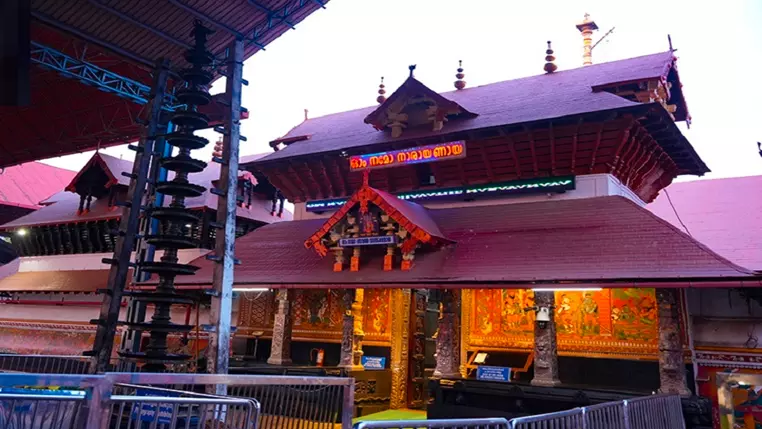Politics
Supreme Court Upholds Tradition of Udayasthamana Pooja in Kerala

The Supreme Court of India has reaffirmed the traditional practice of the ‘Udayasthamana Pooja’ at the Guruvayur Sri Krishna Temple in Kerala. This significant ritual will take place on December 1, 2023, in accordance with long-standing customs. The court’s ruling ensures that this day-long ceremony, held during the auspicious occasion of ‘ekadashi’, will proceed as per tradition without alterations.
The Udayasthamana Pooja is a vital event at the Guruvayur temple, running from sunrise to sunset. It includes a continuous series of 18 poojas, along with homam, abhishekam, and other sacred rites. A bench comprising Justices J K Maheshwari and Vijay Bishnoi acknowledged that this ritual has been performed continuously since 1972, highlighting its importance in the temple’s religious calendar.
The Supreme Court’s decision follows a previous criticism of the temple’s Devaswom administration, which had opted not to conduct the Udayasthamana Pooja during ekadashi. The administration cited concerns over crowd management and the intention to provide more time for devotees to participate in darshan. The bench expressed concern about the administration’s decision, questioning how such a change could be made to a ritual that is deeply rooted in tradition.
In its ruling, the court referenced the historical significance of the Udayasthamana Pooja, noting that it has been a part of the temple’s practices long before its formal documentation in 1972. The plea challenging the administration’s decision was filed by P C Harry and other family members with priestly rights to the shrine. They emphasized that ekadashi is the temple’s most important festival and that alterations to the ritual could disrupt its spiritual integrity.
The petitioners argued that the rituals were originally established by the revered Vedic philosopher Adi Shankaracharya. They contended that any deviation from these traditional practices would harm the manifestations of divine energy, or “Chaitanya,” associated with the rituals. The court’s ruling underscores the importance of preserving such customs, reflecting a broader commitment to maintaining cultural and religious heritage.
As the case progresses, the court has directed the involved parties to finalize their pleadings, with a subsequent hearing scheduled for March 2026. This decision not only reinforces the significance of the Udayasthamana Pooja but also emphasizes the judiciary’s role in safeguarding religious traditions within the framework of Indian law.
-

 World4 months ago
World4 months agoSBI Announces QIP Floor Price at ₹811.05 Per Share
-

 Lifestyle4 months ago
Lifestyle4 months agoCept Unveils ₹3.1 Crore Urban Mobility Plan for Sustainable Growth
-

 Science3 months ago
Science3 months agoNew Blood Group Discovered in South Indian Woman at Rotary Centre
-

 Sports3 months ago
Sports3 months agoBroad Advocates for Bowling Change Ahead of Final Test Against India
-

 World4 months ago
World4 months agoTorrential Rains Cause Flash Flooding in New York and New Jersey
-

 Top Stories4 months ago
Top Stories4 months agoKonkani Cultural Organisation to Host Pearl Jubilee in Abu Dhabi
-

 Science4 months ago
Science4 months agoNothing Headphone 1 Review: A Bold Contender in Audio Design
-

 Top Stories4 months ago
Top Stories4 months agoAir India Crash Investigation Highlights Boeing Fuel Switch Concerns
-

 Sports3 months ago
Sports3 months agoCristian Totti Retires at 19: Pressure of Fame Takes Toll
-

 Business4 months ago
Business4 months agoIndian Stock Market Rebounds: Sensex and Nifty Rise After Four-Day Decline
-

 Politics4 months ago
Politics4 months agoAbandoned Doberman Finds New Home After Journey to Prague
-

 Top Stories4 months ago
Top Stories4 months agoPatna Bank Manager Abhishek Varun Found Dead in Well









